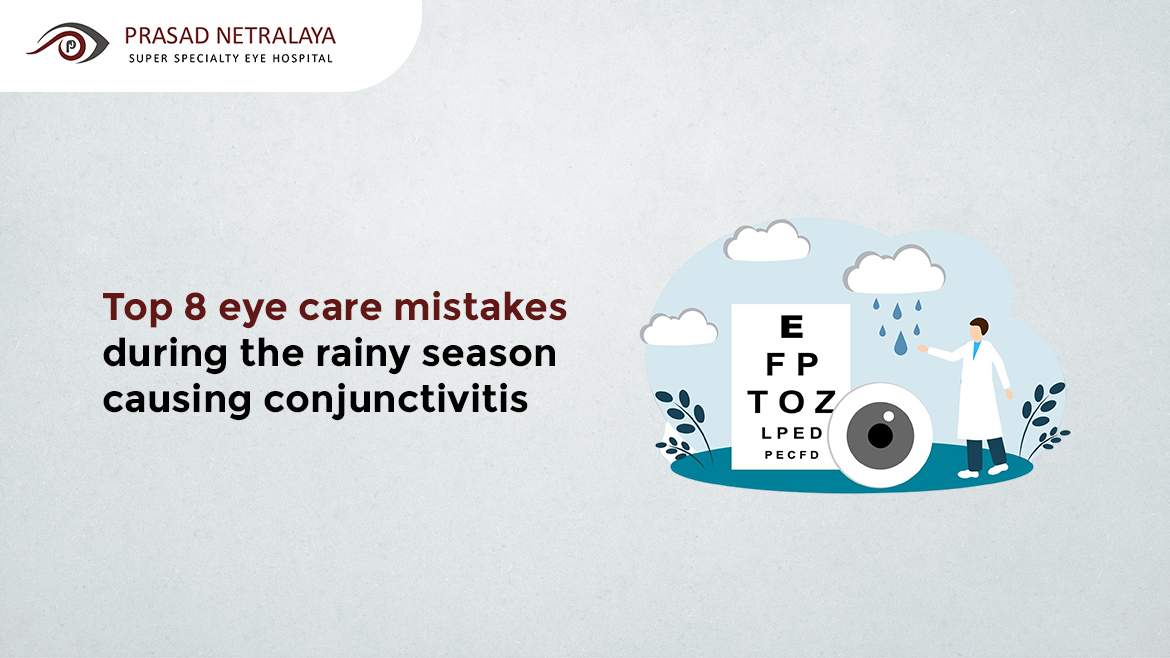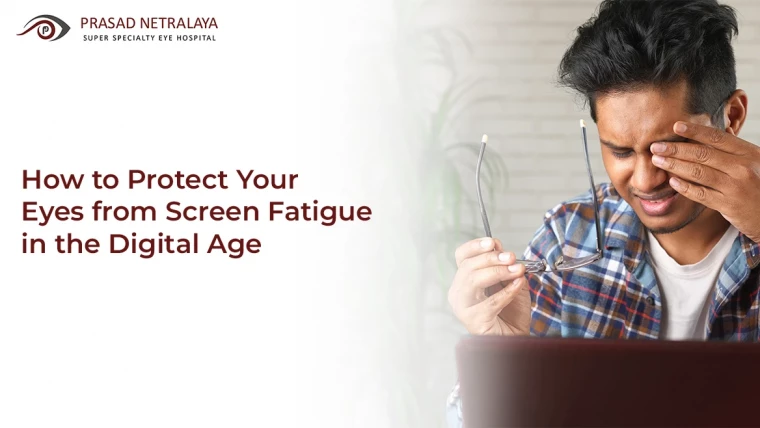It goes without saying that the monsoon season offers a refreshing break from the heat, with cool breezes and soothing rain showers. However, as calming and serene rainy seasons are, they also come bearing dangers for our eyes.
How? Rainwater often mixed with pollutants, dust, and bacteria, can lead to a variety of eye problems, including bacterial and fungal conjunctivitis, dry eyes, styes, and even corneal ulcers. So, to keep your eyes safe and healthy during this season, you must take extra care and stay vigilant at all times.
In this blog, we will walk you through the top eye care mistakes during the rainy season to avoid, ensuring your vision stays clear throughout the monsoon.
Table of Contents
Avoid these 8 common eye care mistakes during the rainy season to prevent conjunctivitis:
1. Not washing your hands frequently
Alt text: Eye Care Mistakes During the Rainy Season
During the monsoon season, our hands are exposed to germs and bacteria that can cause eye infections. The most effective way to safeguard your eyes is by washing your hands thoroughly before touching your eyes.
This simple practice can go a long way in saving yourself from eye infections. In case, rainwater gets into your eyes, gently rinse them with clean, drinkable water. If you’re experiencing redness or irritation, consult an eye specialist without delay.
2. Using eye cosmetics carelessly
During the rainy season, eye makeup can easily smudge and enter your eyes. So the most ideal option would be wearing waterproof eye makeup and never sharing it with others. In case of non-waterproof eye products, they may degrade in moisture, leading to fungal growth.
Additionally, avoid using such products, especially if you wear contact lenses.
3. Avoiding protective eyewear
Alt text: Eye Care Mistakes During the Rainy Season
We often tend to forget the importance of protective eyewear, especially during rainy season. When we step out in the rain, the polluted rainwater can easily enter our eyes and increase our chances of having an eye infection.
Note: Refrain from sharing your protective eyewear with anyone else.
4. Sharing your personal products
Sharing personal products, especially eye makeup, is never a good idea, regardless of the season. Many people unknowingly share items like eyeliners, kajal, or mascara, not realizing that this is one of the easiest ways for bacteria and viruses to spread. During rainy season especially, eye makeup can get washed into the eyes, causing irritation.
Those who wear contact lenses should avoid sharing their eye drops, as this can easily transmit infections. So, always ensure to keep your products to yourself and avoid sharing at all costs.
5. Wearing contact lenses while swimming or bathing in contaminated water:
Swimming pool water contains harmful chemicals, which can irritate eyes and cause discomfort, redness and blurry vision. Or it may even cause eye infections. Hence, always remember to remove contact lenses while swimming or bathing in contaminated water to keep your eyes safe.
6. Vigorous eye rubbing
It’s not advisable to touch or rub your eyes with clean hands let alone unclean hands. When your eyes feel itchy, try gently patting them. In rainy season, when your hands are likely to get in contact with bacteria, rubbing your eyes with those hands can lead to infections. Vigorous or prolonged rubbing in general can be damaging, especially to the cornea, which is vulnerable due to its exposed location.
7. Being around waterlogged areas
Many infections thrive in waterlogged areas. While it’s tempting to enjoy the beauty of the season by playing in puddles, and spending time near such spots, it’s best to avoid them in order to keep your eyes safe.
Stay safe by trying to remain indoors, avoid eating outside, and stay away from waterlogged areas.
8. Taking self medication
In case of any eye problem during monsoon, self medication should be avoided without recognizing the root cause of the problem. Completely refrain from using eye drops without prior consultation with your ophthalmologist at your nearest eye hospital.
Also read: The 5 Best Eye Doctors in Mangalore for 2024
Clear up your vision this monsoon season with Prasad Netralaya:
If you happen to experience any discomfort, redness, or other symptoms, don’t hesitate to seek professional advice. Prasad Netralaya, with its team of expert ophthalmologists, is here to provide you with the best eye care solutions while utilizing the latest technology to produce the best outcome.
Visit or book an appointment through our website today, to have your eye problems resolved as early as possible.
Choose Prasad Netralaya Hospital today and get closer to crystal-clear vision!
FAQs (Frequently Asked Questions):
1. Is conjunctivitis common in the rainy season?
Yes, conjunctivitis is very common during the rainy season, along with other eye infections like styes, corneal ulcers, and fungal infections.
2. How do you keep rain out of your eyes?
Wearing protective eyewear is one great way to shield your eyes from rainwater, reducing the risk of infections.
3. Can rain affect the eyes?
Yes, rain can affect the eyes. Oftentimes, exposure to rainwater can lead to eye issues like conjunctivitis, dry eyes, and redness, especially from bacterial or fungal infections.
4. How can I protect myself from conjunctivitis?
Wash your hands thoroughly or use a sanitizer frequently after your hands come in contact with someone who has pink eye, and avoid touching or rubbing your eyes to prevent spreading the infection.
5. How to take care of your eyes during the rainy season?
The easiest and simplest way to care for your eyes during the rainy season is by regularly rinsing your eyes with cool water to remove irritants that help reduce the risk of allergies and infections.
Dr. Vikram Jain, M.S. had his medical training (MBBS) from Kasturba Medical College, Mangalore, India. He did his master’s in Ophthalmic surgery from Kasturba Medical College, Manipal. He currently manages the Glaucoma department of Prasad Netralaya hospital.



